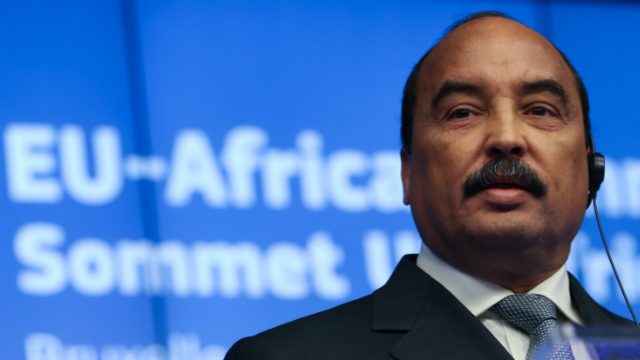SUMMARY
This is AI generated summarization, which may have errors. For context, always refer to the full article.

BAMAKO, Mali – The Mali government and the three main rebel groups in the northern desert have signed a ceasefire deal to end days of violence in the Tuareg heartland, the African Union’s negotiator announced.
“We have just signed an agreement which opens the way for a ceasefire,” Mauritanian President and African Union chairman Mohamed Ould Abdel Aziz said on Mali public television early Saturday, May 24, after brokering the deal.
“The deal comes into effect with the signature of all parties,” he said, after first the rebel group in their northeast fiefdom Kidal agreed, and later at 21:30 GMT when Interior Minister Sada Samake signed on behalf of the government in Bamako.
Kidal is the cradle of Mali’s Tuareg separatist movement, which wants independence for a vast swathe of northern desert it calls “Azawad” and which has launched several rebellions since the 1960s.
Abdel Aziz cut short a visit to Rwanda to hold the urgent ceasefire talks with the Tuareg rebels groups: National Movement for the Liberation of Azawad (MNLA), the High Council for the Unity of Azawad (HCUC) and the Arab Movement of Azawad (MAA).
He travelled by private jet and then helicopter to Kidal, 1,500 kilometers (900 miles) northeast of Bamako, accompanied by Bert Koenders, the head of the local UN mission MINUSMA.
Mali President Ibrahim Boubacar Keita praised the work of his Mauritanian counterpart in securing the deal. (READ: Stern warning by Mali leader as rebels free hostages)
“All day he negotiated. He convinced our brothers… that there is no alternative to peace and the negotiating table,” he said.
Around 20 Malian soldiers have been killed and 30 wounded since Wednesday, May 21, as Tuareg and Arab insurgents captured the flashpoint town of Kidal and the smaller settlement of Menaka, according to the defense ministry. (READ: Around 30 missing after rebels, army clash in Mali: local government)
The rebels said they had seized control of several places, a claim contested by the government which had announced a unilateral ceasefire on Wednesday.
The army has been pinned back by a coalition of several armed groups, including Tuareg separatists.
Bamako and the rebel group agreed to release prisoners as soon as possible, to facilitate UN humanitarian efforts “and to respect the principles of human rights,” MINUSMA said.
They also agreed to setting up an international commission of enquiry to look into the country’s recent troubles.
Meanwhile government officials said strategic errors were to blame for the army’s defeat in Kidal.
“There was a big failure in the chain of command… It is clear that someone in the army took an initiative that was not theirs to take,” a senior official told Agence France-Presse (AFP).
Mali’s ‘humiliation’
Opposition politicians, in a joint statement given to AFP on Saturday, called on Prime Minister Moussa Mara to resign, accusing him of being a major contributor to the fighting in Kidal and to Mali’s “humiliation”.
“The president of the Republic, the Prime Minister and their government are mainly responsible for the tragedy in Kidal and the humiliation of our country… given the seriousness of the situation, we demand the resignation of Prime Minister Moussa Mara and the dissolution of the government,” read the statement.
It was signed by the two major opposition parties, the Union for the Republic and Democracy (the party of former finance minister Soumaila Cisse) and the Party for National Rebirth (headed by Tiebile Drame, a former foreign minister). The statement was also signed by the Party for the Restoration of Mail-Fasoko Values, a smaller political group created last year.
The MNLA ended a nine-month occupation of the governor’s offices in November last year as one of the conditions of a June peace deal that paved the way for presidential elections.
But the process deeply divided the MNLA, whose ultimate goal is the independence of Azawad.
Up until the agreement, the Tuareg group had refused to allow any government soldiers or civil servants into Kidal.
The country descended into crisis in January 2012, when the MNLA launched the latest in a string of Tuareg insurgencies in the north. (READ: Mali ‘at war with terrorists’ after clashes: PM)
A subsequent coup in Bamako led to chaos, and militants linked to Al-Qaeda overpowered the Tuareg to seize control of Mali’s northern desert.
A French-led military operation launched in January 2013 ousted the extremists, but sporadic attacks have continued, and the Tuareg demand for autonomy has not been resolved. – Rappler.com
Add a comment
How does this make you feel?
There are no comments yet. Add your comment to start the conversation.